As a second project in the research-oriented MA course „Multi-local families in times of increased geographical and communicative mobility“ (summer term 2020), we present Pia Weide’s project „Mediated Food Rituals of transnational families – ‘Doing family’ from a distance – Emotional connectivity and co-presence in culinary practices“.
Researching rituals in culinary practices performed by Germany-based migrants and their distant families on video-based platforms in relation to familyhood.
Mediated co-presence can be created through the use of video-based platforms, which provide emotional connectivity and intimacy, but can also bring communicative challenges and tensions along. By analysing different forms of presence, such as Ambient Co-Presence (Madianou, 2016), Mediated Co-Presence (Marino, 2019) and Connected Presence (Licoppe, 2004) and interviewing migrants living in Hamburg, Germany, I aim to move towards the following questions:
How do rituals in communication practices influence the everyday live of transnational families?
What kind of (new) emotions are created in ambient co-presence?
What role does food play in experiencing emotional boundaries in transnational families?
What emotional difference is experienced when sharing food in mediated co-presence compared to physical presence?
Culinary practices are strongly connected to personal and social identification markers and enable individuals to create a feeling of shared and cultural identity. Food often functions as a preservation of a feeling of belonging, especially in family contexts. It is not just a physical necessity, but also a psychological one that offers community-based practices. Food often organises families’ everyday live at home – so what happens, when food becomes deterritorialized from the physical place of home? How do food practices and emotions shift in mediated co-presence within transnational contexts families?
How can transnational families overcome the physical distance by creating digital rituals of communication in order to exchange emotions, sensory experiences and shared feelings of connectivity?
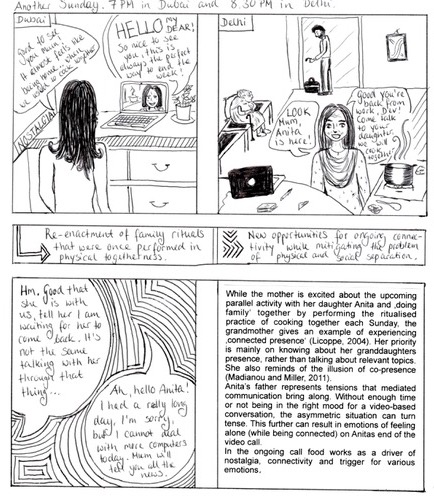
“(…) food ‘stirs the emotions’ precisely because of its physical nature and sensual affordances, which ‘call the continuity of identity through a vivid nostalgic experience.’”
Lupton 1996: 30.

About the author:
Pia Weide is currently enrolled in the Masters program of Modern South Asian and Southeast Asian Studies at Humboldt University of Berlin.
She studied ‘Regionalstudien Asien / Afrika’ at Humboldt University of Berlin and graduated with a bachelor’s degree in 2018.
The research-oriented MA course „Multi-local families in times of increased geographical and communicative mobility“ (summer term 2020) has resulted in very creative works. In this series we present some of the projects, starting with Emma Lo’s work.
Doing family multi-locally can be facilitated by range of different tactics and technologies to keep a family connected across distances and borders. One of these methods of connection is the act of mailing packages and crossing borders with additional baggage containing goods for families. Care packages can be a highly personalized and intimate form of communication, but their contents are subject to national and international regulations (Tristram 2020), and may be informed by a number of micro-and macro-level decisions that shape a multi-local family’s configuration of care (Böcker et al). While this long-established method persists, particularly among multi-local families from East and Southeast Asia, new technologies have made it possible to digitalize aspects of care packages. This zine presents the concept of the care package in the context of multi-local families, and highlights the trajectory of this method in the digital age. The format of this zine, which combines a physical cut-and-paste technique with digital editing, points to the new dynamic that defines multi-local families today: a combination of material and digital interactions that overlap and continuously feed into one another.
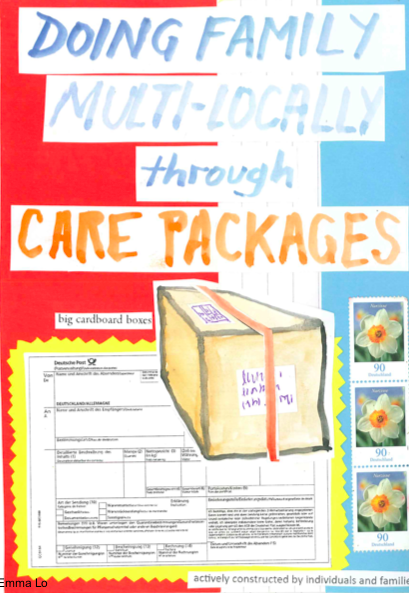
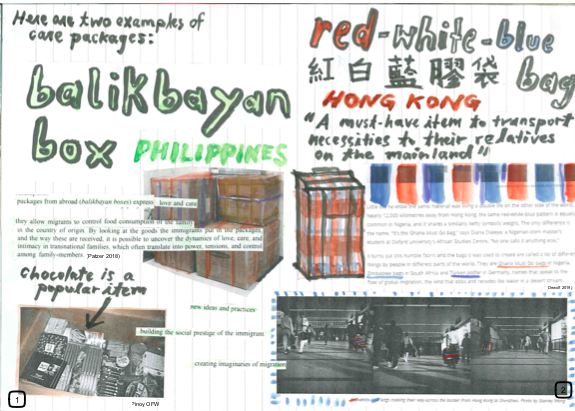
For overseas Filipino workers (OFW), the balikbayan (return to home) box is a kind of care package sent to ‘left-behind’ family members in the Philippines, especially around holidays. These boxes may include cosmetics, shoes and clothing, canned foods and other food items, and even electronics to be repaired (Pinoy-OFW.com 2019). In Helena Patzer’s research on OFWs in the US (2018), she emphasizes the importance of food in balikbayan boxes. Considering the implications of food shipments for multi-local families, she argues that packages from abroad “allow migrants to control food consumption of the family in the country of origin,” which can impact the “changing patterns of food consumption in the community of origin,” touching on the concept of ‘social remittances’.
Another variation of the care package is the red-white-blue bag, which often accompanies travelers between Hong Kong and mainland China. Wessie Ling (2018) writes that “the image and nature of border-crossing travellers carrying a Red-White-Blue bag has developed especially since the 1980s, when mainland China adopted an open policy encouraging population flow between the two regions.”Ubiquitous in East Asia, these bags have also spread to other regions, and are “called a lot of different things by people in different parts of the world. They are Ghana Must Go bags in Nigeria, Zimbabwe bags in South Africa and Türken Koffer in Germany, names that speak to the flow of global migration”(Dewolf 2019).
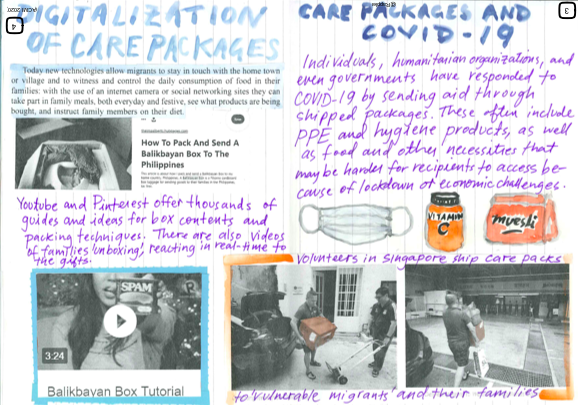
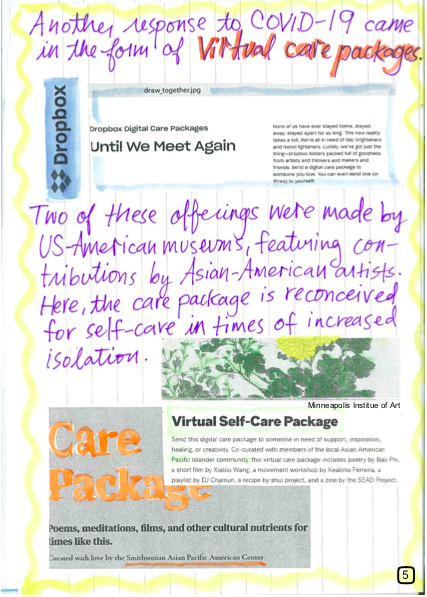
After presenting these two types of packages, the zine enters a discussion of contemporary influences: digital innovations and the ongoing corona virus pandemic. Digital platforms provide information about postal and customs regulations, and social media platforms feature multi-media content that offer suggestions for how and what to pack. Mobile phones with video calling capacities allow the recipient family members to open care packages with the sender looking on, who can explain in real-time the contents of the box. This added digital element to the packing, sending, and receiving process brings a new synchronous dynamic to the method. Among the global effects of corona virus are serious issues that affect multi-local families, such preventing people from traveling home, an increased scarcity of certain items, and further economic strain. As scarcities differ from country to country and locality to locality, multi-local families have been shipping surgical masks and other in-demand items to family members in other locations. In addition, charities and some state actors have also shipped boxes of supplies, tests, and trial vaccines to those in need.
Finally, the zine offers some reflection on the conceptual reach of care packages, and traces their influence in the way people are curating content during pandemic-related lockdowns. Without the option to convene in-person events, cultural institutions have put together packages that are shared digitally, offering collections of visual art, poetry, and film, with an emphasis on ‘self-care’. Similar to multi-local families, these institutions have to innovate to find ways to maintain a community from a distance, and have also found the package concept useful.
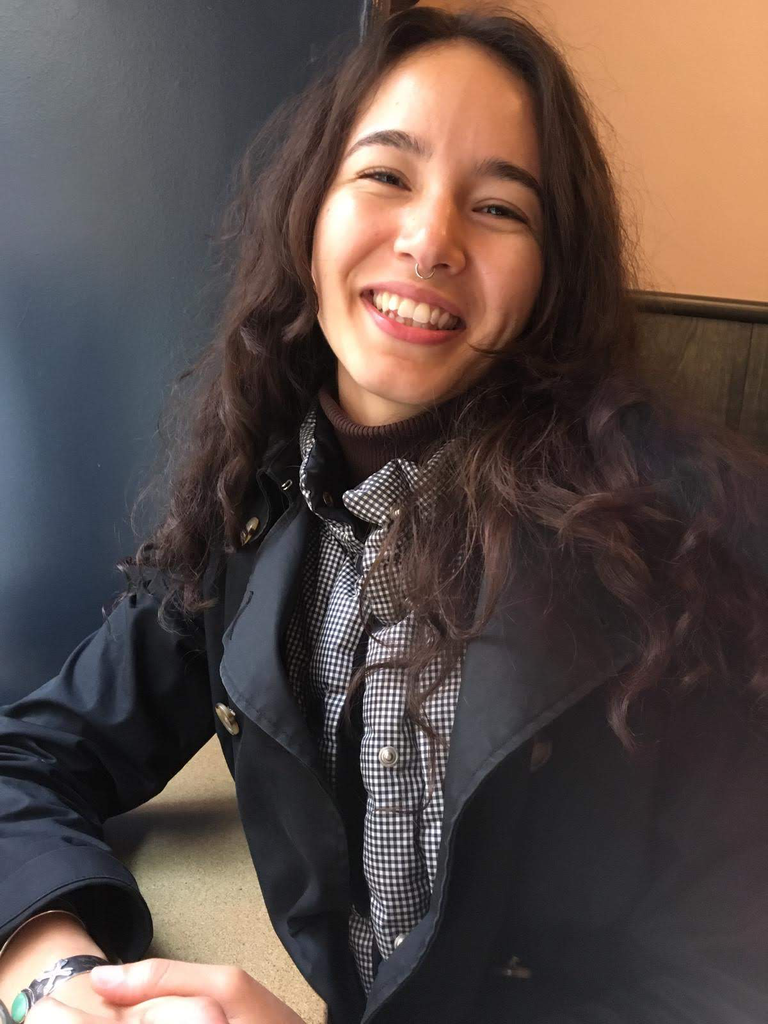
About the author: Emma Lo is currently enrolled in the Masters program of Modern South Asian and Southeast Asian Studies at Humboldt University of Berlin.
She studied Political Science (with Commendation), Modern Languages and Literatures at Kenyon College in Ohio and graduated with a bachelor’s degree in 2015.


